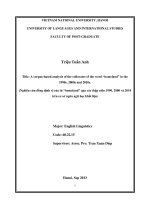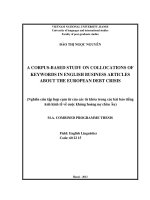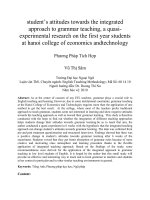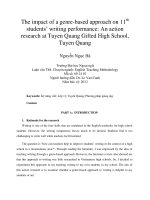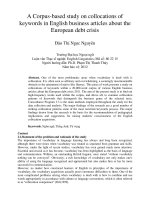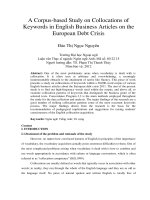A corpus based research on epistemic modality expressions as mitigation markers in british and american political speeches (tt)
Bạn đang xem bản rút gọn của tài liệu. Xem và tải ngay bản đầy đủ của tài liệu tại đây (220.9 KB, 26 trang )
THE UNIVERSITY OF DANANG
UNIVERSITY OF FOREIGN LANGUAGE STUDIES
HOÀNG THỊ KIM CÚC
A CORPUS- BASED RESEARCH ON EPISTEMIC
MODALITY EXPRESSIONS AS MITIGATION
MARKERS IN BRITISH AND AMERICAN
POLITICAL SPEECHES
Major: ENGLISH LINGUISTICS
Code: 822.02.01
MASTER THESIS IN FOREIGN LANGUAGES,
LITERATURE AND CULTURE
(A SUMMARY)
Da Nang, 2018
This thesis has been completed at University of Foreign
Language Studies, The University of Da nang
Supervisor: Assoc. Prof. Dr. Trần Hữu Phúc
Examiner 1: Assoc. Prof. Dr. Nguyễn Tất Thắng
Examiner 2: Dr. Y Tru Alio
The thesis was be orally defended at the Examining
Committee.
Time: 19th , October 2018
Venue : University of Foreign Language Studies
- The University of Da nang
This thesis was available for the purpose of reference at:
-
Library of University of Foreign Language Studies, The
University of Da Nang.
-
The Information Resources Center, The University of
Da Nang.
1
Chapter One
INTRODUCTION
1.1 RATIONALE
Politicians in every nation in the world obviously know that
delivering speeches is the most important part of their job. Political
speeches, like any other talk, may potentially violate hearers'
interactional rights, face wants, or ideological autonomy. As a result,
politicians have to pay close attention to the listeners' reaction in
order to meet the requirement of the hearer’s face want or not to
impinge on the hearer’s interest. More than ever, through speech
delivering, politicians know they can motivate or dissuade political
action.
As such, politicians find it necessary to use modality
expressions in their speeches to raise the importance of the
message and show their concerns about hearers’ needs.
In fact, a broad range of modality expressions as mitigation
markers combined with alethic, epistemic, deontic and existential
senses, have been analyzed at linguistic forms in some types of
discourse. Nevertheless, little research has been deeply conducted on
epistemic modality expressions as mitigation markers. In other
words, few studies have been touched on mitigation markers in the
use of epistemic modality expressions.
For the reasons mentioned above, I decided to conduct “A
corpus-based research on epistemic modality expressions as
mitigation markers in British and American political speeches” as
2
my master thesis. The research is expected to provide English
language learners with certain comprehension of epistemic modality
expressions as mitigation markers in political speeches made by
British and American politicians.
1.2. AIMS AND OBJECTIVES
1.2.1.
The
Aims
study aims at extensively investigating epistemic
modality expressions used as mitigation markers that British and
American leaders use in their political speeches. Through this, lexical
entries and syntactic structures used as mitigation markers are
analyzed through the method of corpus-based approach. Moreover,
the study’s findings are expected to contribute to the betterment in
the use of modality devices, which facilitates the comprehension and
application in English discourse analysis.
1.2.2.
-
Objectives
To classify and describe types of mitigation markers that
British and American politicians use in their speeches.
-
To examine lexical entries and syntactic structures of
epistemic modality expressions used as mitigation markers in
British and American political speeches.
-
To compare the similarities and differences in the use of
mitigation markers between British and American politicians
in their speeches.
1.3 SCOPE OF THE STUDY
This study mainly concentrates on the analysis of epistemic
3
modality expressions as mitigation markers regarding lexical entries
and syntactic structures in political speeches made by British and
American politicians in a certain range of time through two authentic
research corpora.
1.4. RESEARCH QUESTIONS
1. What are the lexical entries and syntactic structures of
mitigation markers found from the research corpora?
2. What types of mitigation markers in political speeches are
classified?
3. What similarities and differences are found from the use of
mitigation
markers in British and American political
speeches?
1.5. SIGNIFICANCE OF THE STUDY
The findings of this study has precious values to facilitate
better understanding of the use of modality expressions concerning
lexical choice and syntactic structures. Additionally, English learners
are provided with an essential reference for more targeted ways in
using mitigation markers and producing special effects in public
speeches to reflect different intentions of the speakers and persuade
the hearers. Furthermore, the findings are supposed to be a useful
source of modality expressions for the teaching and learning of
English and especially for those who are interested in investigating
the use of epistemic modality expressions in political discourse.
1.6. ORGANIZATION OF THE STUDY
Chapter 1: Introduction
4
Chapter 2: Literature Review and Theoretical Background
Chapter 3: Research Design and Methodology
Chapter 4: Findings and Discussion
Chapter 5: Conclusions and Implications
5
Chapter Two
LITERATURE REVIEW AND THEORETICAL
BACKGROUND
2.1. LITERATURE REVIEW
Regarding research on the use of modality expressions in
discourse, so far a number of studies have been carried out.
Palmer (1986: 9-10), reproducing Jespersen (1924), claims
that modality expresses “certain attitudes of mind of the speaker
towards the contents of the sentence”. This can be considered as a
seminal study for the pragmatic aspect of modality. Besides, quoted
in Palmer (1986), Jespersen’s (1924) lists twenty sub-categories of
modality which is divided into two sets.
Von Wright (1951) suggests a distinction of four ‘modes’ the
alethic ,epistemic, deontic and existential modes.
According to Lyons (1977: 793), “category of modality is
concerned with matters of knowledge and belief” of the speaker. He
also makes a distinction between the two kinds of epistemic modality
namely objective and subjective which are synonymous with
traditional modal logic and linguistic modality, respectively. Of these
two types, Lyons (1977) considers subjective epistemic modality to
be more concerned with linguistic modality than objective epistemic
modality.
Through a corpus-based analysis, Trailovic (2014) studies
political speeches of warfare delivered by George Bush and Barack
Obama. His thesis examines a variety of lexical entries delivered by
the two American Presidents from 2001 to 2013.
6
In Vietnam, a number of linguistic researchers have paid
attention to studies on modality. Their diverse notions on modality
can be seen in Cao Xuan Hao (1991:51) in which he classified
modality into two different aspects.
Tran Huu Phuc (2015) studies modality expressions as
politeness strategies in British and American ambassadorial speeches.
From the revision of previous studies and theoretical
approaches to modality as presented above, it can be claimed that
Facchinetti and Palmer’s (2004) view has great influence on studies
of modality expressions. has great influence on the modality marker
analysis in political discourse.
2.2. THEORETICAL BACKGROUND
2.2.1. An overview of modality
With the historical length from Aristotle’s time, the study of
theoretical modality with
many approaches via
semantic and
pragmatic features suggests that modality is often used in
psychology, linguistics to express the lack of commitment toward the
content of the proposition.
Different studies of modality have investigated from different
angles and there are thus a variety of approaches to analyse theories
of modality. Moreover, these approaches also provide more notions
and subcategories to reflect the relationship between subjectivity vs.
objectivity; and performativity vs. descriptivity.
Palmer (1986) focusing on the subjectivity of modality,
defines it as grammaticalization of speaker’s attitudes and opinions
in an attempt to express certainty, possibility, willingness, obligation,
necessity and ability by using modal words and expressions.
7
Lyons (1977: 452) claims that modality refers to a speaker or
writer’s “opinion or attitude towards the proposition that a sentence
expresses, or the situation that a proposition describes” (see also
Quirk et al., 1985: 219).
Although there have been a variety of studies on modality in
different ways but the most common point in the definition of
modality is to state the speaker’s attitude to
the content of
proposition, to the objective reality. Especially the correlation
between the speaker and the addressee in terms of the basic semantic
categories of modality.
2.2.2. An introduction to corpus linguistics
Corpus linguistics is the language study based on the basic of
corpora. This study approach has thus grown quickly to linguistic
studies.
Samples of texts selected for the subject matter of the
research are compiled into a corpus or corpora. Corpus-based
analyses are usually specialized in the use of software programs and
data of electronic format. Therefore, corpus linguistics is an
approach to studying language in discourse via computerized data to
collect and analyze data quantitatively and qualitatively.
2.2.3. Epistemic modality
Coates (1983: 18) suggests that epistemic modality not only
mentions to the assessment of possibilities but also expresses the
lack of confidence in the truth of the proposition expressed.
On the work of Palmer (1986) epistemic modality is also
characterised in terms of contrast between subjective and objective
epistemic modality, or subcategorised according to the writer’s
8
judgment of necessity and possibility on the one hand, and
evidentiality on the other hand. Hengeveld (1988) states that the
objective modality is used for evaluating the part of the writer’s
knowledge of the state of affairs.
On the contrary, Facchinetti and Palmer (2004) show that
epistemic modality is also divided into 2 types: epistemic possibility
and epistemic necessary.
Hengeveld (1988) states “knowledge of possible situations
obtaining in S’s conception of reality or of a hypothesized situation”.
Epistemic is considered the stable modality compared with other
categories of modality, as Nuyts (2006: 6) claims, “the core
definition of this category is relatively noncontroversial”
2.2.4. Speeches and political speeches
Speech includes a variety of linguistic components with high
structures that is used as delivering the purpose of communication. It
conveys the speaker’s views and convinces the hearer with specific
purposes.
From Reisigl’s view, it can be considered that speakers are
presented a variety of styles of language use to accomplish the speech
acts in expressing speaker’s point of views and persuade the hearer
through speeches.
Since this research
investigates
the use of modality
expressions as MMs in British and American political speeches, the
relation between political speeches and speech arts will be compared
to point out that speech arts not only serve the communicative
purposes but contribute to the success of political speech delivery.
9
Therefore, politicians serve their specific political goals by
delivering political speeches with particular functions to persuade the
audience and make them believe what is being said.
It is important that to make political speeches, the distinction
between their “structure” and “style” is extremely important for the
success of political speech delivery, as Charteris- Black (2005: 4).
The combination between the factors above and the speaker’s
performance contribute to the success of politicians.
2.2.5. Mitigation expressions
Mitigation markers are modality expressions used in the
utterance to attenuate the sense of obligation or necessity imposed on
hearers in order to preserve both the speaker’s and hearers’ face. The
term epistemic modality marker refers to linguistic elements, whose
main function is the qualification of the writer’s commitment or lack
of commitment to the truth of the proposition.
The semantic aspects of modality expressions can be seen in
the senses of epistemic necessity referring to what is known –
deduction; and epistemic possibility speculation. With two basic
notions of possibility and necessity, epistemic modality
as
mitigation markers in term of lexical items and syntactic structures
plays an essential roles in politeness of the speech, mitigating turntaking violations, and aid persuasion. From those reasons, mitigation
markers would give fundamentally political conditions for the
speakers' divergent choices.
Therefore,
the
discursive
occurrence
of
metalingual
mitigation markers in a political address satisfies the three rules of
politeness: formality, hesitancy and equality or camaraderie (see
10
Lakoff, 1977: 88).
According to Facchinetti and Palmer (2004), modality
construed metalingual adverbials whose chiefly pragmatic function
are threefold: on the interactional level, on the pragmatic level and on
the political/ideological level. Moreover, with some lexical items and
syntactic features related to mitigation markers in political speeches
will take into consideration in this study.
In sum, this study chiefly focuses on their view to analyze the
epistemic modality expressions in terms of lexical entries and
syntactic structures and their functions as mitigation markers in
samples of British and American political discourses.
11
Chapter Three
RESEARCH METHODS
3.1. A CORPUS- BASED ANALYSIS
Research corpora together with the appropriate corpus-based
method can help language researchers produce
the natural and
authentic language data from a variety of speakers or writers and they
needn’t have to pay attention to intuition on their own or native
speakers’one.
Thus, with the effectiveness of a corpus-based method and
the utility of the software package of WordSmith 5.0, this research on
epistemic modality expressions used as mitigation markers in the
discourse of political speeches is expected to reflect issues of attested
language into the theories of modality.
3.2. DESIGNING THE RESEARCH CORPORA
3.2.1. An introduction to research corpus design
Hunston’s (2002: 25-31) suggests four principals
in
delivering a research corpus are size, content, balance and
representativeness. As such, it can be seen that to design a research
corpus, the most important thing is to meet the principals set out
above.
Since my study is epistemic modality expressions as
mitigation markers, it is based on the texts of native speakers and
meet four principles mentioned above. The size of text is large
enough, balanced enough with 58 speeches (191,316 words) made
by four American politicians and 44 speeches (197,479 word)
selected from four British politicians. (detailed in 3.2.2. below).
12
Besides, the content of corpora is suitable for research objective
because it contains the important elements that is necessary for
analyzing.
Last but not least, these two research corpora are presented
by native speakers as British and American politicians, this can be
concluded that it may represent for authenticity and validity.
3.2.2. Collecting texts and building the research corpora
Tables 3.1 and 3.2 below show details of the two
machine-readable text corpora used in this research.
Table 3.1: Data on the corpus of the US Presidents’ speeches (The USC)
Politician
Date range
No. of speeches
No. of words
US01
1981-1992
14
47,071
US02
1993-1998
9
50,899
US03
2001-2004
14
45,097
US04
2005-2009
21
48,249
Total
58
191,316
Table 3.2: Data on the corpus of the UK Prime Ministers’ speeches
(The UKC)
1
13
Politician Date range No. of speeches No. of words % of words
UK01
1975-1989
16
55,297
28%
UK02
1999-2007
11
52,564
26.6 %
UK03
2005-2010
7
43,086
21.8%
UK04
2010-2011
10
46,532
23.6%
44
197,479
100.00%
Total
3.2.3. Description of samples
American and British political speeches are collected from
on-line sources. These speeches are in electronic format and are
therefore easily complied into the research corpora used for the study.
Among 102 political speeches, 58 speeches made by
American presidents and 44 speeches made by British Prime
Ministers whose names have been anonymous and these speeches
were delivered by the politicians from 1992 to 2011.
3.2.4. Data analysis
After collecting samples of mitigation markers from a large
number of randomly chosen political speeches, they will be
qualitatively and quantitatively interpreted, and then classified,
described and analyzed by using the tables, pie charts or diagrams.
In addition, the analyses of frequency use of mitigation
markers help to find out the linguistic characteristics of commonlyused modality expressions in American and British political
speeches.
14
Chapter Four
FINDINGS AND DISCUSSIONS
4.1. INTRODUCTION
This chapter presents analyses of the pragmatic aspects of
epistemic modality expressions as mitigation markers in American
and British political speeches. The speeches are identified as the
primary data source since they have been made by native Englishspeaking politicians.
4.2
EPISTEMIC
MODALITY
EXPRESSIONS
AS
MITIGATION MARKERS
4.2.1. Mitigation markers in form of modal auxiliaries
The investigation into epistemic meanings of these modal
auxiliaries shows that the epistemic sense of mitigation is found only
in the modal may, should and would which indicates the speaker’s
implication of mitigating the illocutionary force in the utterance
presented as analyzed below.
4.2.1.1. Mitigation markers with may
4.2.1.2. Mitigation markers with should
4.2.1.3 Mitigation markers with would
4.2.2. Mitigation markers in form of other modal
forms
This section concentrates on analyzing other modal forms (or
non-auxiliary modals) collected from the research corpora as
modality markers including patterns with modal lexical verbs, modal
adjectives, modal adverbs and modal nouns. These modality
expressions show the speaker’s levels of certainty and commitment
to the proposition presented.
15
4.2.2.1. Mitigation markers with modal lexical verbs
It can be seen from investigation into the epistemic sense of
modal lexical verbs in the research corpora that believe, know, see
and understand combined with the I pronoun express the strong
commitment. While think, hope, expect and wish are modal lexical
verbs denoting the sense of weak commitment. These conveys the
speaker’s implication of lacking confidence in the content of the
proposition.
4.2.2.2. Mitigation markers with modal adjectives
Other patterns with modal adjectives expressing strong
commitment or subjective commitment to the content of the
proposition are found in two research corpora such as
‘I
am
confident that…’, ‘I am hopeful that…’, ‘I am certain that…’
4.2.2.3. Mitigation markers with modal adverbs
Patterns of modal adverbs as MMs collected from the two
research corpora occur in two subcategories. One is in the category
of modal adverbs as
sentence modifiers in their functions as
“peripheral in clause structure” (see Perkins, 1983: 90). The other
consists of modal adverbs as “verb modifiers” occurring within the
structure of the utterance and directly modifying the main verbs.
4.2.3. Other patterns as mitigation markers
4.2.3.1. Inclusive We as mitigation markers
Actually, the modal must occurring in patterns collected from
the research corpora is in the deontic sense of modality. The sense of
mitigation is in that when deontic must is combined with the first
person plural subject inclusive ‘we ’, this expression includes both
the speaker and hearers (understood as ‘you’) in the responsibility for
16
performing the act uttered. The pattern of ‘We must’ is used as the
speaker’s attitude of mitigating the sense of imposing an obligation
directly on hearers.
4.2.3.2. Impersonalization as mitigation markers
The MMs found in the research corpora indicate that the
speaker intentionally reminds the hearers of their responsibility for
the event presented. These MMs linked with impersonal subject It or
general subject to convey the force of obligation imposed on
someone else other than on hearers. The passive structure makes the
attitude of obligation become weaker as there is no overt subject
indicated as being responsible for the performance of the action
presented.
Accordingly, the passive structure is a safer way for the
speaker to impose the sense of obligation indirectly on hearers.
4.3.
A
COMPARATIVE
ANALYSIS
OF MITIGATION
MARKERS IN BRITISH AND AMERICA POLITICAL
SPEECHES
4.3.1. Introduction
This section is used for comparative analysis of the
frequency use of MMs in British and American political speeches.
The account of modality expressions APs and BPs produce in
implementing their speeches along with the classification of MMs
will be used to discuss the similarities and differences between the
APs and BPs in the
use of
modality expressions as MMs in
discourse.
4.3.2. A comparative analysis of mitigation markers in
British and America political speeches
17
Table 4.1: Frequencies of mitigation markers collected in the
research corpora
Mitigation Modality
The UKC
The USC
Subtotal
would/ 912(65.2%)
787(68.7%)
1699(66.7%)
334(23.8%)
230(20.1%)
564(22.2%)
24(1.7%)
36(3.2%)
60(2.4%)
124(8.9%)
85(7.4%)
209(8.2%)
7(0.6%)
12(0.5%)
markers
Expressions
Epistemic
may/
modal
should
auxiliaries
Modal
I
lexical
think/
know/
verbs
hope/
see/
believe/
expect
Modal
I am sure/
adjectives
confident/
optimistic
/ certain/
hopeful
Modal
Perhaps/
adverbs
Probably/
Maybe
Modal
There
nouns
doubt/ It’s my
is
no 5(0.4%)
belief that/ It
is
my
hope
that…
Total
1399(100%) 1145(100
%)
2544(100%)
18
Generally, the analysis of the differences between the APs
and the BPs in their use of MMs as presented above may reveal
certain non- linguistic reasons for their difference in culture.
Although the analysis of the pragmatic functions of modality
expressions as MMs in the selected political speeches cannot reveal
how different British and American politicians are in their culture,
findings from the use of modality expressions as MMs reveal that the
APs seem to be more informal and personal while the BPs appear to
be more formal and reserved.
The next section is a comparative analysis of major patterns
of modality expressions with high frequency use as MMs in the USC
and the UKC.
4.3.3. Major categories of mitigation markers found in the
research corpora
4.3.3.1. Patterns of mitigation markers with
inclusive We
Table 4.2: The frequencies of pattern We must
We must
The UKC
152 (54.1 %)
The USC
129 (45.9 %)
Total
281 (100%)
The higher frequency of this pattern as MMs in the UKC than
in the USC also reveal that APs are more personal while BPs seem
to be more reserved and cautious in expressing their opinions and
commitment to the propositional content of the sentence through the
19
use of inclusive we combined with deontic must to mitigate the
attitude of imposing an obligation on hearers.
4.3.3.2. Impersonalization as mitigation markers
Table 4.3: The frequencies of impersonalization
It must
General subject
Total
+ must
The UKC
34 (52.4 %)
23
57(53.8 %)
The USC
28 (47.6 %)
21
49 (46.2 %)
Subtotal
62 (100%)
44 (100%)
106 (100 %)
It can be concluded that both British and American
politicians use the patterns with
impersonalization as mitigation
markers in their speeches and these are considered as MMs of
avoiding imposion on the hearers. However the higher frequency of
these MMs in the UKC than in the USC proves that British
politicians appear to be more reserved indirect and more objective in
expressing the sense of obligation. Meanwhile American politicians
tend to be more personal, more subjective and more direct.
4.3.3.3. Passivization as mitigation markers
Table 4.4: The frequencies of passivisation
Passivisation
The UKC
46 (61.3 %)
The USC
29 (38.7 %)
Total
75 (100%)
20
Observations of the data sets of such patterns collected from
the research corpora show that BPs use a lot of passivized patterns
with deontic must to mitigate the illocutionary force, avoid imposing
on some direct subject than the APs do. It can be stated that British
politicians (BPs) are more objective, reserved and less imposing on
the content of the utterance presented.
21
Chapter Five
CONCLUSIONS AND IMPLICATIONS
5.1. CONCLUSION
In brief, here are the conclusion from the analysis of epistemic
modality markers in political speeches by American and British
politicians. This study approached the semantic and pragmatic
functions of epistemic modality expressions in American and British
political speeches. In addition, it also contributes to the theories of
epistemic modality with the comparative analyses of mitigation
markers used by British and American politicians in their speeches.
It is always thought that Americans are more positive than
British in communication (e.g. they slap the back or shoulder in
interactions). However, there has been no research to support this.
There has been little study on modality expressions between British
and American discourse and, of course, no study between British
and American political speeches either. Therefore, this research
contributes to the practice of the discourse community with the
analysis of epistemic modality expressions as mitigation markers in
the particular discourse of political speeches.
The results obtained during the analysis, classification, and
identifying in Chapter 4 Findings and discussion (see 4.3.2 and
4.3.3) of this thesis show that American politicians are more
personal and informal in making a political speeches whereas the
tentativeness, cautiousness and formality British politicians use in
expressing their point of views or attitude through the use of MMs.
In other words, it can be claimed from this research that American
22
politicians are more positive-oriented whereas British politicians are
more negative-oriented in the use of modality expressions as MMs.
5.2. IMPLICATIONS AND RECOMMENDATIONS
This thesis provides a new approach to the study of modality
expressions used in English public speeches. It can also help the
readers to appreciate the public speeches better. Just as one of the
elderly educators once said, “The best way to learn the most concise,
forceful and refined English is to study public speeches in English”.
Thus, this study will certainly provide a meaningful aid to improving
our communication in English and it
may be beneficial to the
teaching and learning of English.
Additionally, this master thesis will serve as a reference for
further studies and provide some instructional guidance for students
of English. The readers will probably employ these mitigation
markers to strengthen their own communicative power and it also
provides the learners with some useful techniques in making
speeches. Basing on the results of the study, we would like to put
forward a number of implications and recommendations.
For students of English, mastering the knowledge and then
applying them to speaking or writing is indeed a challenge. From the
findings of this thesis, it is hoped that students would appreciate the
beauty of political language in famous speeches. It will not only help
them get a better understanding of the political language but also
provide them with some epistemic modality expressions in speech
delivering for various real-life purposes.
Through political speeches containing modality expressions,
teachers can help improve students’ speaking skill to a great extent.
23
Students can learn how to use these naturally and effectively in oral
communication via their everyday conversations or their own
presentations or speeches. Moreover, students can develop their
reading skill, especially reading comprehension. They can interpret
what they are reading better and as a result they can have a thorough
grasp of the reading materials.
For the teaching of English, how to find out the most effective
method for teachers of English to help their students speak naturally
and effectively is still a big concern at the moment. This study would
give a suggestion on teaching public speaking. The teacher should
encourage his students to practice translating and writing political
speeches, etc. As a teacher of English as a foreign language, I have
noticed that teaching English through famous speeches is an
interesting teaching style for the learners.
Moreover, teaching language through political speeches is
desirable because of the authenticity of the material. Teachers can
encourage students to use modality expressions in their speaking to
express their thoughts and ideas more clearly, concisely and
convincingly.
5.3. LIMITATIONS
Although we have tried our best in finding materials and
investing our efforts, there are still shortcomings in this thesis due to
the limited time, knowledge and references. Furthermore, the
similarities and differences between the use and the frequent
occurrence of all semantic categories of modality should be
presented. However, due to limitation in the scale of this thesis, only

